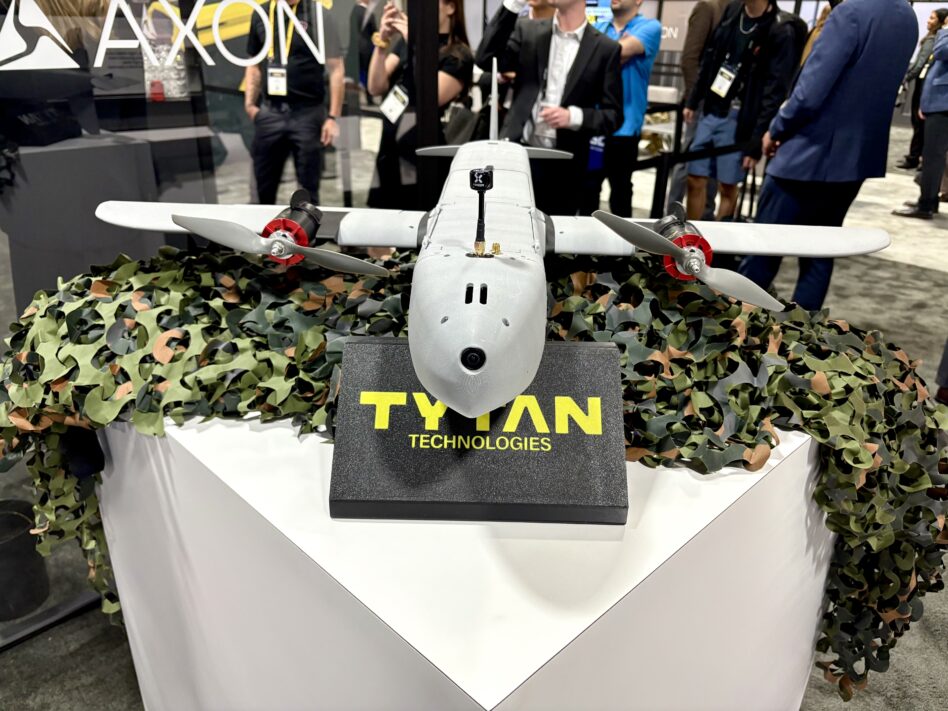The great transatlantic team-up continues. On Tuesday, counter-drone big dog, Dedrone by Axon, and German startup TYTAN announced a partnership integrating Dedrone’s sensors and detection tech onto TYTAN’s autonomous Group 3 drone interceptors.
Shoot ‘em down: Dedrone, which was snapped up by public safety tech company Axon (the Taser-maker) last year, is an OG in the counter-drone space. Since 2014, they’ve focused on handheld jammers and mobile and fixed-site drone detection sensors, but, as you might’ve heard, drones have become pretty resilient against EW in Ukraine. TYTAN builds the things that—when all else fails—blow them up.
The German startup spun out of a student project at the Technical University of Munich two years ago. Their Munich-based team makes cheap, autonomous mini-missiles designed to intercept Group 3 drones, especially the big Shahed-shaped ones.
As Dedrone CEO Aaditya Devarakonda told Tectonic at AUSA, Dedrone has “historically been very good at ‘detect, track, identify and mitigate’ (DTI-M) using electronic warfare, radars, and cameras,” but teaming up with TYTAN helps Dedrone “complete the kill chain” on the Group 3 and kinetic front.
Here’s what the mash-up will look like:
- On the Dedrone side, the core tech will be its DedroneTracker.AI, the company’s platform that fuses radio, RF, acoustic, and optical inputs to create a unified drone detection picture.
- Dedrone’s ground sensors, which are already widely used in Ukraine and elsewhere, detect incoming drones and feed the location and targeting info to TYTAN’s autonomous interceptor, which is integrated with DedroneTracker.AI.
- When TYTAN’s interceptor locks onto the enemy drone in the air and enters the kill box, it switches to the onboard computer before it makes contact and goes boom.
“We’ll be able to understand where Shahed-136 are coming in, provide a very clear track on where those enemy targets are, and then autonomously navigate an interceptor to create the impact to stop the incoming drone,” Devarakonda said.
Boom on a budget: The whole thing, as TYTAN co-founder and CEO Balazs Nagy told Tectonic at AUSA, is “always cheaper than the enemy drone. We are ramping up [production] right now, and we will be even cheaper.” Devarakonda told us the integrated product comes in at less than $10,000 per shot.
It’s also EW-resistant and currently operates in GPS-denied environments, because, as Nagy added, “The first thing you learn in Ukraine, you are there [without GPS and comms] and you’re fucked…so this is the first problem you have to solve.”
The integration is already being tested in Ukraine, according to Devarakonda, who’s “seen it fly at 300 kilometers an hour.”
TYTAN taking off: Teaming up with Dedrone is just the cherry on top of a pretty good week for TYTAN. German outlet Frankfurter Allgemeine Sonntagszeitung reported last week that the startup secured a big-time contract with the German army to help build up drone defenses. TYTAN told Tectonic the contract is in the “tens of millions,” but how many tens remains a mystery.
Devarakonda called that contract “validation,” but said, “I feel confident that with our help, as well as in our interest in moving this forward together, we will succeed in creating a good end-to-end solution that we would love to bring to the US market.”
Money moves, indeed.

